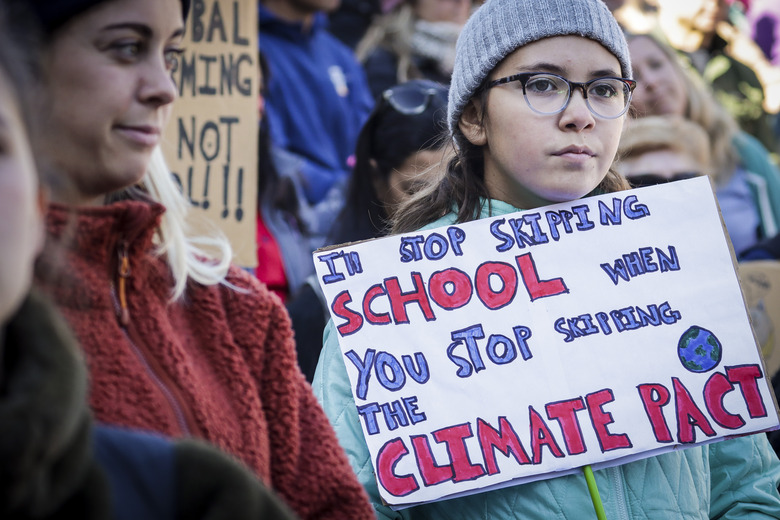News Roundup: Science News You May Have Missed
Between busy schedules and a news cycle that just keeps on giving, it can be tough to keep up with all the science stories happening around the world. We get it! And we've got you covered. Keep reading for a quick look at some of the science and environmental-focused news you may have missed over the past few weeks.
Climate Strike
Climate Strike
- Young people have had enough, and they took to the streets to show it. A year after 16-year-old Swedish climate activist Greta Thunberg launched a solo strike outside of Sweden's parliament building, 7.6 million people across every continent (yep, even Antarctica!) stepped out of their classrooms or workplaces to participate in a youth-focused global climate strike on Sept. 20.
- Later, even more people were inspired by Thunberg's passionate speech to the United Nations, where she called out world leaders and policymakers on stealing her childhood with their empty promises.
- For more information on keeping up with climate activism, keep tabs on the official page for the Global Climate Strike.
Purdue Pharma
Purdue Pharma
- Lawmakers have long called for members of the Sackler family, the billionaire owners of Purdue Pharma, to be held accountable for their role in the opioid crisis that has killed more than 200,000 people. The latest in the company's lengthy legal battle and potential bankruptcy case? They've proposed paying $200 million in the next six months to fight the opioid crisis in exchange for a pause on the litigation against individual Sacklers. It's just another wrinkle for the judge to consider as he determines whether or not to continue pursuing the Sackler family in a case that's expected to go on for some time.
- The news comes as medical professionals have issued a new warning about opioids – but this one is about _under_prescribing, not overprescribing. Scared about getting patients hooked (or about getting sued), many doctors have shied away from handing out Vicodin like it's candy. The effect might help to prevent addiction in some cases, but it also keeps people who truly need the medication in debilitating pain. Patients, caretakers and some physicians have recently tried to come to the defense of those pain sufferers. In response, the U.S. Department of Health has released a new set of guidelines urging doctors to better identify and treat individuals who need opioids to comfortably live and work, including helping them responsibly taper off the drugs as their symptoms improve.
Bolivian Wildfires
Bolivian Wildfires
- The worst fires Bolivia has seen in two decades have been raging for months, charring more than 10 million acres of land and killing more than 2 million animals.
- President Evo Morales has said that his administration has put $20 million toward extinguishing the flames, but hundreds of thousands of protestors – many from the country's indigenous populations, which are feeling the effects the hardest – argued that the response was too slow, and that an aggressive farming policy focused on deforestation is what prompted the raging, destructive fires in the first place.
- Hopefully, an end is in sight. Heavy rains fell earlier this week and put out some of the flames, but experts worry that hot, sunny weather will come back and reignite the blazes.
California Blackouts
California Blackouts
- California is on fire, too. Or at least, it's threatening to be, and the state's main electric provider, PG&E, is trying to prevent out-of-control flames by preemptively cutting power to about 600,000 residents in Northern California.
- The company says the move would stop wildfires started by utility equipment. But some people are wondering if leaving residents powerless is the right move, especially considering it hasn't completely stopped fires from starting – and considering it certainly seems like a move designed to protect the company from more lawsuits that may or may not cost the company upwards of $30 billion.
More Vaping Deaths
More Vaping Deaths
- We hate to have to keep saying it: Put down the vape. What started as a small outbreak in the Midwest has escalated to 1,3000 illnesses in 49 states. Twenty seven people are dead.
- Lawmakers in some states have made moves to ban Juuls and other vaping products. Some experts worry that won't curb the problem, though, since some medical professionals believe that it's the black market vapes that are to blame in the first place (even though they're still not sure exactly what is causing the lung disease in the first place). With so much uncertainty, the only way to guarantee not getting sick is to avoid vaping at all.
All-Female Spacewalk Back On
All-Female Spacewalk Back On
- You may remember that back in March, the world's first all-female spacewalk was supposed to happen. Spoiler: It didn't. During the preparations, the astronauts realized that NASA only had one medium-sized suit, the size both women needed.
- The incident seemed to highlight how even when glass ceilings are broken, sometimes those spaces (no pun intended) aren't as welcoming or accommodating as they need to be. But NASA was determined to make the all-female spacewalk happen, and they've made sure that two of the astronauts on board have the right-sized suits for their mission to upgrade outdated batteries to lithium.
- Keep your eye out for the historic event on Oct. 21.
Cite This Article
MLA
Dragani, Rachelle. "News Roundup: Science News You May Have Missed" sciencing.com, https://www.sciencing.com/news-you-missed-in-september-13722380/. 16 October 2019.
APA
Dragani, Rachelle. (2019, October 16). News Roundup: Science News You May Have Missed. sciencing.com. Retrieved from https://www.sciencing.com/news-you-missed-in-september-13722380/
Chicago
Dragani, Rachelle. News Roundup: Science News You May Have Missed last modified August 30, 2022. https://www.sciencing.com/news-you-missed-in-september-13722380/
